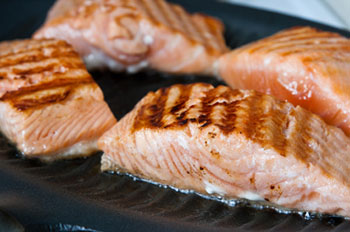It's easy to get answers about health and nutrition! Just send your question by email to [email protected] and Dr. Harlan will respond to selected questions of general interest. Answers will be posted in the Ask Dr. Gourmet newsletter (sign up now!) and archived in the Ask Dr. Gourmet section of the website.
Please note that the Ask Dr. Gourmet feature is restricted to questions regarding food and nutrition. Due to the many questions we receive, not all questions may be answered. For more specific questions about your individual health, please contact your doctor. About Timothy S. Harlan, MD, FACP, CCMS | Terms of Use | Privacy Policy
Ask Dr. Gourmet
How much Omega-3 Fatty Acids should I be getting per day?
I eat a lot of albacore tuna. The package says it contains 450 milligrams [of Omega 3 fatty acids] per 1/4 cup. Is this as good as salmon? How much should the daily intake be to be good for our health?
Dr. Gourmet Says...

There are no studies yet that tell us the optimum amount of omega-3 fatty acids to eat.
The best research comes from the Inuit Eskimos. They have a lower incidence of coronary disease according to a paper presented by Dr. Neil J. Stone of the American Heart Association. This finding was surprising because the Eskimos also have a high fat diet. But the difference is that the fats consumed are very high in omega-3 fatty acids, or fish oils. This type of fat has been under a lot of investigation by researchers with varying results. The claims are that fish oils reduce total cholesterol and triglycerides, raise HDLs (good cholesterol), reduce LDLs (bad cholesterols) and discourage blood clotting (beneficial in reducing development of plaque) are generally supported by the research, however.
The general consensus is that most people benefit from eating fish high in omega-3 fats about 2-3 times a week, and this is now widely recommended by physicians and dietitians. These are usually found in cold water fishes like herring, salmon, mackerel and trout.
There are many studies investigating the effects of supplements versus actual fish consumption. Again, conclusions are mixed and some results are controversial. The American Heart Association position statement recommends supplements only for those few people who have extremely high triglycerides and who have not responded favorably to standard dietary treatments and/or medications, and who are at high risk for pancreatitis. However, Dr. William Connor of Oregon Health Sciences University conducted a study on fish oil supplements and found that people could reap the benefits of omega-3 oils from an intake of 2 grams a day. Since your 1/4 cup of tuna is 450 mg and there are 1000 mg in a gram this amount would be about 25% of the 2 grams a day that Dr. Connor studied.
In actual fish terms, that could equal about 4 ounces of salmon to meet that recommendation.
I think that we will see a lot of research coming soon on how to use omega-3 fatty acid supplements, but I always like eating my way to health - so like you, I eat tuna, salmon, or some fatty fish at least twice a week.
Thanks for writing,
Timothy S. Harlan, MD, FACP, CCMS
Dr. Gourmet
